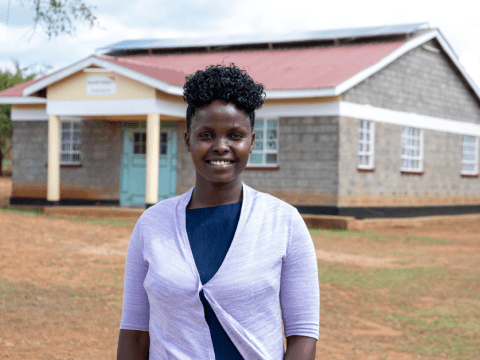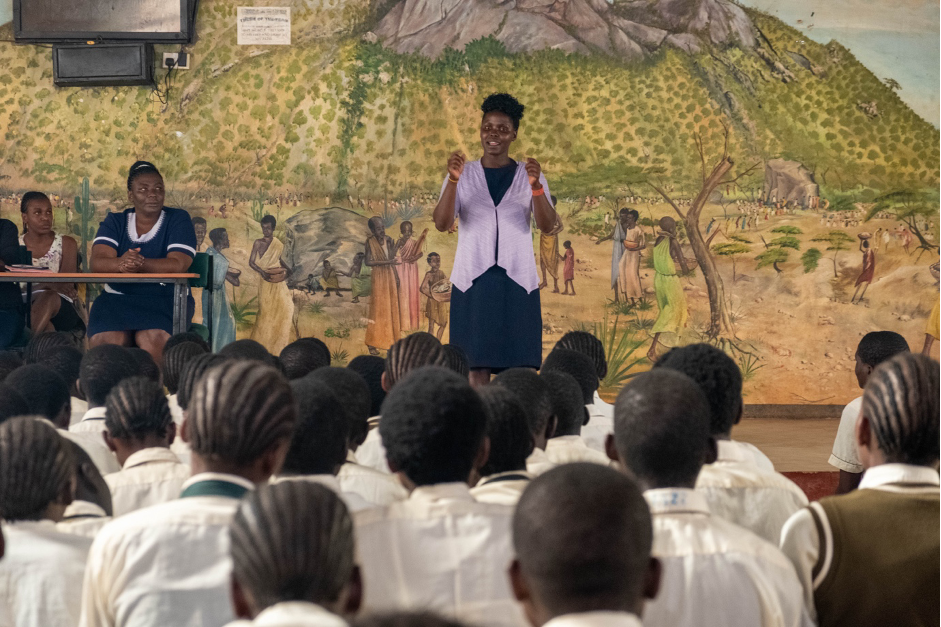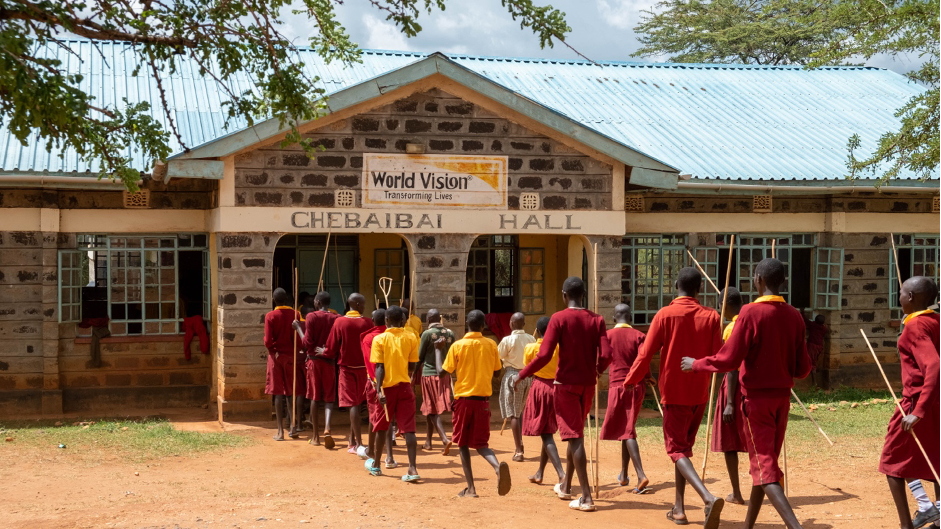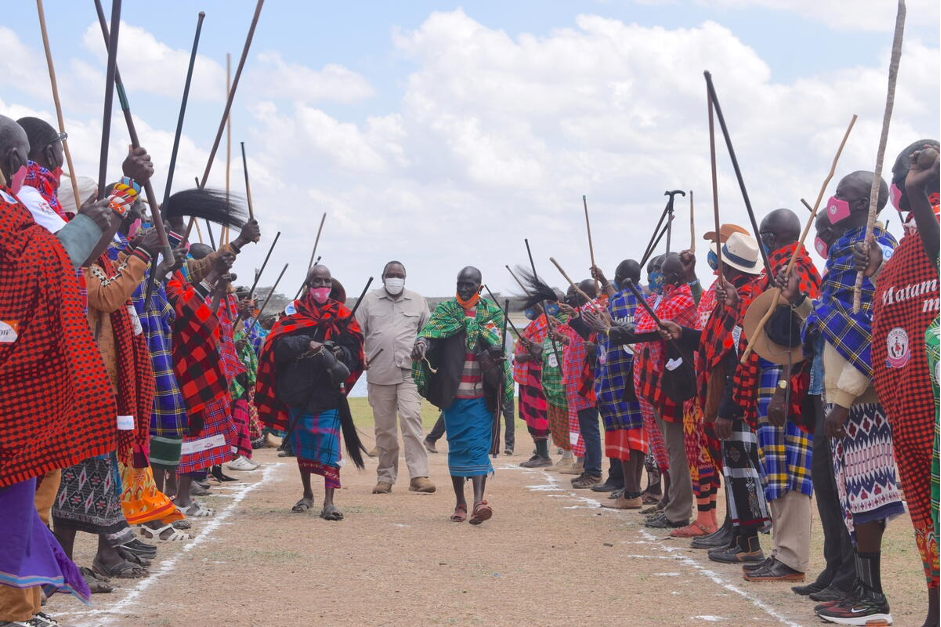No Girl Should Face This Pain: World Anti-Female Genital Mutilation Day and the Call for Change

By Waweru Chris Avram and David Nderitu, World Vision Kenya
- Female Genital Mutilation (FGM) is a harmful practice affecting millions of girls worldwide. Dominica's story exemplifies the transformative power of education in combating FGM, highlighting the importance of survivor-led movements.
At only 10 years of age, Dominica Chelatan was earmarked to undergo FGM and get married just like other girls in West Pokot. The value of girls in her community was seen when they underwent FGM and got married. In return, their parents got cows in the form of a bride price.
Dominica's Journey: Resilience Amidst Adversity
Luckily for Dominica, she had heard of Morpus Rescue Center in West Pokot which was providing a haven for girls like her. When she learned of her father’s plans, she ran away from home and found refuge at the rescue center.
Progressing through primary school in Morpus Rescue Center, Dominica’s resilience shone brightly. She completed her education from standard five through standard eight, but an uncertain future lay ahead. “After that, I had nowhere to go. During that year, we had some visitors who came to our school. We shared our story of how we escaped from home in search of an education with them and they were touched,” Dominica shares.
The empathy of the visitors led to a promise of sponsoring her secondary school education at St. Elizabeth Girls High School in Kipkomo sub-county of West Pokot County, offering a lifeline she eagerly embraced. Established in 2010 after World Vision and donors visited Morpus Primary School, St. Elizabeth Girls’ High School warmly welcomed Dominica and her peers. Starting with 14 girls and later expanding to 29, the institution became a haven for empowerment and growth.
Empowering Communities, Amplifying Voices
It was only after Dominica completed secondary school and scored a better grade than her brother that her father acknowledged that girls are worth more than FGM and child marriage. For the first time, he [Dominica’s father] paid her college fees.
Dominica has since completed college and now invests her time in mentoring young girls and educating her community on the dangers of FGM. Her voice is an inspiration to many girls who are at risk of undergoing FGM and child marriage.

Dominica’s story is not an isolated incidence, it is one among many for girls in communities that still practice FGM. Research shows that at least 200 million women and girls alive today have been subjected to FGM, including 4 million in Kenya alone. And 650 million were married before their 18th birthday.
In Samburu County, 86% of women ages 15 to 49 have undergone FGM, and 77% were cut to become eligible suitors. This has resulted in only one out of ten girls enrolled in secondary school there. Samburu community is not the only community still under the shackles of FGM, Communities like the Kuria, Pokot, Sabaot, and some parts of the Maa community still practice this archaic tradition, strongly guarded by the elders who are the custodians of the customs.
This year, nearly 4.4 million girls are at risk of FGM around the world, a total of 12,000 new cases every day all over the world. An estimated $2.75 billion is needed to end the practice by 2030 in 31 priority countries, including Kenya.
As the world marks the 13th International Day of Zero Tolerance for FGM, with a rallying call under the theme, “Her Voice, Her Future, Investing in FGM Survivor-Led Movements to End Female Genital Mutilation”. World Vision joins this call by empowering girls like Dominica and amplifying their voices to lead conversations on ending FGM.
How has World Vision's Kenya Big Dream programme contributed to combating FGM and empowering girls?
Through the Kenya Big Dream (KBD) programme, World Vision implements initiatives aimed at ending FGM in the counties of West Pokot, Baringo, Samburu, and Migori. So far, 497 girls have been rescued from FGM in the past year alone, with 461 girls facilitated to go through school. 61 circumcisers have since reformed, with 67 morans engaged to be protectors of girls in their respective communities.

World Vision has also collaborated with various child-related stakeholders to train participants in Citizen Voice in Action in Nomboroi, Samburu County, teaching them about government laws and policies opposing FGM and sexual offenses. A day after the training, nine girls destined for child marriage removed their bride-to-be necklaces and enrolled in school.
Through the programme, 947 children have also gone through Alternative Rites of Passage (ARP) - a community-owned initiative that seeks to act as an alternative to FGM for girls. Girls who have gone through ARP are accepted by communities as having graduated to teenagerhood without undergoing FGM.
In the buildup to this year’s International Day of Zero Tolerance for FGM, KBD in partnership with the Anti-FGM Board (the national body mandated by the government of Kenya to fight FGM in Kenya) organized an elders’ forum that brought together elders from the Pokot, Samburu, Kuria, and Sabaoti communities.
The forum was held in Samburu County at the site where Samburu elders made a declaration to end FGM in their community in 2021, in the presence of former President Uhuru Kenyatta, E.G.H, culminating in a joint commitment by the elders to end FGM in their communities by 2025. The elders also pledged to support the government’s effort of ensuring that children get their rights to education with 100% transition from primary school to university level.

While this is an ambitious target by the elders, achieving it requires a multifaceted approach such as amplifying the voices of survivors like Dominica. Investing in education which has proved to be effective in changing perceptions of FGM is key. Had Dominica not gone to school, her father would not have embraced the value of girls and their right to education.

Turning the tide on child marriage and FGM also requires a multi-sector approach to create lasting change. We join UNICEF in calling on the global community to sustain the momentum towards the achievement of SDG 5.3 - eliminate all harmful practices, such as child, early, and forced marriage and female genital mutilations by accelerating investment in survivor-led movements and elevating the voices of survivors, leading to the elimination of FGM. We also call upon all the survivors to come out and wear their hearts on their sleeves and speak up against FGM and early child marriage to save the girl child from this barbaric tradition.
Men and women in leadership positions should also join the call to action and speak up against FGM. This year’s theme “Her Voice, Her Future” amplifies the need to eliminate this practice by speaking up and condemning this harmful practice at all levels. Let us all join in, support, and participate in this worthy cause.